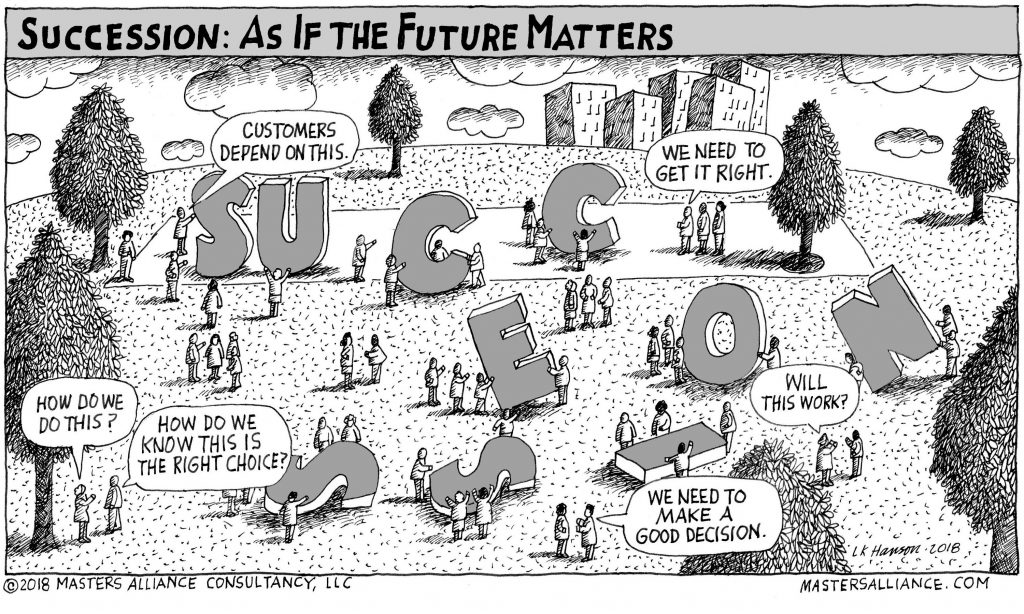In our 30 years of working with clients all over the globe, there’s one very important conversation that rarely comes up – but it should. And while it’s not talked about, it plays out in front of us. As outsiders, we can see it so plainly: It’s the ultimate “who’s who” throughout your organisational structure, your leadership group and your future.
What’s the conversation that no one wants to have? Succession Planning. Why is this conversation so well hidden, so oft deferred, and so thoroughly avoided? Because it represents change. The leadership legacy you leave when moving on to your next role is likely to be equal to, or even more impactful than, the business strategy you just took 6 months to implement. While a well-planned change in leadership would seem a highly critical task, we don’t prioritise this on our long to-do lists. Why not?
Discussion / Decision Difficulties
The conflict between strengthening your legacy and moving-on.
Let’s face reality – it’s more fun to move on than to choose, much less prepare, a successor! Whether your new opportunity is a new role, a new company, or a new phase of life, these opportunities are exciting and hold great expectations. The desire to get on to the next attractive challenge, maybe leaving behind some difficult unfinished business, can help overcome any regrets of parting ways with the current team. However, enlightened, skilful transitions require some intentional planning, discipline and an attitude of responsibility.
Fear of making a critical mistake vs. a peaceful, satisfying transition.
The succession decision is one of the loneliest, most important leadership decisions you need to make in any of your roles. You may have been promoted many times, but how many times were you deeply involved in the replacement decision? Have you experienced this opportunity to be a real difference-maker? Have you succeeded? How do you know? How do you plan to do it better next time? Who needs to be involved?
Too weary of this chaos to take on one last challenge.
You have fought the good fight. You have experimented, tried many things – some very successful, some not so much. Progress has been painful, but very gratifying at times. You have gained traction, but much more to do. You know that you could more freely make some tough decisions on the way out. Is it worth the angst? Or will you regret it later if you don’t?
Now the “yin and yang” of differing desires, motivations impacting succession becomes clearer.
Focus on What’s at Stake in the Business
Planning your replacement is more important than just the legacy you leave. It is more important than continuing the special work, maintaining the upwards trajectory, and other feel-good words often used to compel leaders to prioritise this activity. It’s about taking the next step with customers, in markets, against competition and engaging your people at an entirely new level. If you choose your successor well, it’s about doing what you never gained the courage to do. It’s loving customers and your people in ways you have yet to discover. If you agree – how do you start, or what’s next in the planning process?
Your Human Resources partners likely have some good criteria to consider in picking your successor – and if they are able (and are capable), they will counsel you to start the process sooner rather than later. Having worked with hundreds of leaders, from all skill levels and walks of life, we have some “Stretch Considerations” for you: Pick someone who is so good it makes you uncomfortable – someone you are certain will do a better job than you have done – even if circumstances would worsen. Have the courage to turn the reins over to someone, who as a kid, was the one who played hard, had skinned and bloody knees – and kept on going. All the time encouraging others to do the same. This is not the time to go with the safe choice, no matter how tempting it is! If you ever really cared about the organisation you are leaving, you’ll see why it’s important to leave it (or your part of the organisation) in even more capable hands than yours.
You might be worried about your reputation. What happens if the “new person” is better than you? It’s a cause for celebration, not mourning! The qualities of the person you are preparing to replace you, to “inherit” your position and responsibilities, say more about you than your successor or your team. They make a statement about how you and others see the future of your organisation, more than it is about your legacy. The real succession accolades come from the realisation that those who replace you are so much better than you – that they are eclipsing all that you have achieved – eclipsing in a good way!
The final view of your successor will be seen much later, when your successor chooses a successor, with the opportunity for the next tiers of replacements to excel and eclipse. If you can’t stomach the idea of someone following in your footsteps while making a bigger difference than you, you can stop reading and run towards the surety of selecting someone who is familiar, good enough, but not too good. It’s a safe choice.
Safe is Not Safe
We submit, however, that this is not the time to play it safe – no matter what your peers, team or Board of Directors tell you. Resist the temptation to let the “heir apparent” path develop. Now is not the time for the path of least resistance! Our complex world requires us to break from the traditional “next person in line” criteria – succession based on tenure only serves the organisation when the heir apparent happens to be the right person for the job. We believe that this traditional process is often followed not because it gets results, but because it’s the most comfortable and predictable, appearing to minimise problems and complaints. Are these words you use to describe what made you successful?
Your successor should reflect how you broke through and made a difference for your organisation. It shouldn’t be a watered-down version of your contributions to the business – in fact, it should be the pinnacle of your success!
More importantly, the “safe path” may not be the most popular and may create more complaints. What about those being led? Will they be excited and a little fearful? Will they see new paths to customer connection and market impact opening up? Will the exemplary team members want to stay, and the underperforming team members want to leave – or will the weaker team members “relax in place” and the stronger team members “dust off their resumes”?

Team Impact
If you worry that a break from the traditional tenure approach will cause disruption in your team – don’t fret. If you get the right person in place, the best will stay. It may, however, cause attrition of those who were waiting for their turn in the promotion line. And that’s ok – let’s look to our younger generations for lessons about loyalty. We know that loyalty to a company is now earned, not expected. How is it earned? By aligning the right opportunities with the right talent - no matter where they fall on the tenure ladder. If you’ve got high talent, high potential individuals who see you making a great succession decision, they’ll stay. If they see that they are “stuck” in an organisation (or part of an organisation) that is “not going anywhere”, they’ll leap frog to another company as soon as they can.
As a starting point, you need to take a candid look at your team. Are you totally satisfied with your team? Is there more that needs to be accomplished? Do you actually have a high-performing team? How do you know? Is it somehow making customer’s lives simpler, more productive, more fulfilling – and in B2B, giving them a competitive advantage? High-performing teams are not static, regardless of the organisation level. If you see no room for improvement in your team OR you know much remains to be gained – the answer is the same – you better raise the bar for the next stage with your replacement.
Do It Creatively
What then, is the alternative to the traditional path? What do you look for? Most importantly - Don’t be typical. Don’t look for typical. Again, look for the person who started life skinning their knees and getting up and running, not the person who was quick to blame when they fell down. Look for the person who took risks early and often, not the person who is afraid to give bad news. Look for someone who has a genuine fire in the belly, not someone who says all the right things. Don’t stop at the person who has spent inordinate time and energy making you look good. Instead, look for a person who has a stellar reputation for making sure something is always “cookin’ in an organisation” – even if they don’t work directly for you now. Look far and wide, internally and externally.
Think Deeper, View Differently
It is the real person and only the real person that should be considered to take over your current responsibilities, and to succeed you. We are all different; having unique views, skill sets and motivations. We are interested in different things, respond to circumstances differently, and even think through things differently. We need to accept that in others, to value differences, not just tolerate them – only then will we see through the veneer to the core, the authentic person.
What about the “extreme pleaser”, the copy cats, the experienced “reflectors” who work to mirror our nature to be liked and chosen for something important? Cut through the smoke by asking them why: “Why is this opportunity important to you, why do you prefer it, why does that excite you?” “Is it comfort?” “Is it expected?”
When you finally get a glimpse of the real person – STOP! Remember, we are all under construction, so even we do not fully know our “real person” at any time. There is an amazing “secret sauce” about getting that true glimpse of a person – we must also share some of ourselves, giving others a really true glimpse of us. The better the openness and sharing, the more revealing the glimpse of others.
When you finally have a list of truly qualified candidates (and you should have a list of more than one – if you’re even trying – otherwise you didn’t look far enough), there are some additional questions to ask yourself:
- Are the candidates prepared to do competitive battle in marketplaces and prepare others to do the same?
- Do they help people grow, learn and achieve their true potential?
- Do you hear them talk about customers with passion and advocate for what they need/expect/deserve from the company?
- Do they have respect for suppliers and expect great things from them?
- Do you hear them challenge assumptions: Ask “Why?” more than once? And search for answers?
- Can they truthfully deliver bad news with as much skill as good news?
- Do they intend to respectfully fill your role even better than you?
A Leadership View
As you answer these questions about your successor candidate list, reflect on the following quotes from leaders:
“Good employees QUIT when leadership is bad. Bad employees QUIT when leadership is good.”
Peter Drucker
“A truly great boss is hard to find, difficult to part with and impossible to forget.”
Brigette Hyacinth
Another thought… some might view succession as more critical at the top of an organisation, but is it really? Aren’t other groups even more critical to engaging, acquiring and keeping customers? Competing in the marketplace? Succession is a big deal throughout an organisation! So, do it right – give it your best attention.
Double-Check for a Difference-Maker Characteristic
Let’s look at heart. Two recent interesting examples…
US Professional Football, Vikings Wide receiver Adam Thielen – from practice squad to Pro Bowl. Asked if he saw Thielen being a Pro-Bowl player when he first became the Viking’s coach, Zimmer said: “No, probably not. But I didn’t know his heart then. Now I know his heart.”
Alex Stalock, backup goalie for US Professional Hockey, Minnesota Wild – ready to play, always. Teammate comments: “Really strong, positive attitude, battles on every shot [even in practice], really cares, wants to make everybody better, finds ways to add value…you really want to put your best out there for him, help him win.”
When you think of your potential replacement, can you justify your top two candidates reflecting on these words and examples? If you aren’t quite sure, you MUST go further! You must dig deeper with the current candidates to find out what they are really made of, and if none of them measure up to your aspirations… well, you know you need to start the search again. Not a process for the weak-willed, is it? Many who are on the verge of transition are tired and worn out, or even remorseful and reluctant. It’s a great case for starting early – when you have the energy and are willing to go the extra mile! Wouldn’t you rather plan your transition while full of excitement and energy, waiting to see what greatness follows you?
Remember: during your transition, you are the “Chief Excitement Officer”, the “Chief Morale Officer” the “Chief Anticipation Officer” – don’t blow it – enjoy it, help your team and others enjoy it. Make it your finest hour – one to look back on and be proud. One that you can use as an example to coach others to success during their careers! Show who you really are… have some fun, go for it!
We Can Help
We can help you energise a “Strategic Combat” culture during your succession thinking! If you are interested in learning more about reaching your full potential, unlocking the strategic power that lies within your company, contact us.
We can help bring these tips to life with your organisation – we provide the tools and experience to help your team think and lead differently. We’ve helped dozens of our clients implement this new way of thinking in their organisations.
Masters Alliance is a 30-year strategic management consulting firm that has helped more than 120 client organisations in over 20 industries in 13 countries gain a competitive advantage in their market. We help organisations develop and implement unique business strategies that work – faster than our clients ever thought possible.
We help clients achieve significant performance gains from a breakthrough understanding of their customers, patients, clients and markets.
Visit mastersalliance.com for more.












